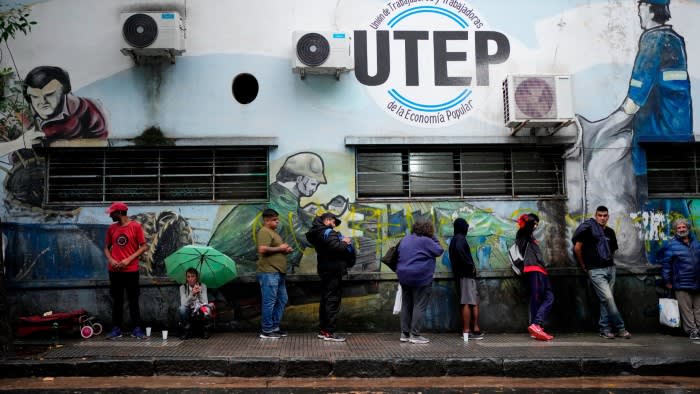Argentina’s new libertarian president Javier Milei has celebrated a glut of economic victories since taking office in December.
Dollar-denominated sovereign bond prices have nearly doubled; the peso’s closely watched black market exchange rate has stabilised; and this week Milei announced Argentina’s first quarter of fiscal surplus since 2008, calling it “a feat of historic, global proportions”.
But on the streets of Buenos Aires, that success feels remote.
“It’s a very ugly time,” said Rodrigo, a 27-year-old from the working-class commuter town of Moreno, who walks the capital’s Parisian-style boulevards selling cleaning cloths to restaurants.
“My clients have less, so they buy less . . . Everyone in my neighbourhood is screwed.”
The austerity and deregulation driving market optimism has, at least in the short term, deepened Argentina’s worst economic crisis in two decades. The economy shrank 3.6 per cent in the first two months of 2024 compared with the same period a year earlier, and consumer spending has plummeted.
But while investors argue that serious pain was inevitable in 2024, they believe the economy will then turn a corner. The IMF forecasts a 2.8 per cent contraction this year, then growth of 5 per cent next year.
Milei is hoping that despite their daily struggles, Argentines will be as patient as investors.
Ezequiel, a taxi driver in Buenos Aires, said rising fuel and car rental costs had shrunk his daily take-home pay to $10, less than the price of a bottle of olive oil. “How is my family supposed to survive with that?” he said.
Milei’s arrival has marked a sharp change of tack from Argentina’s previous left-leaning Peronist government, which strove to keep consumer spending up. It fixed prices and the value of the Argentine peso, subsidised energy and transport, and printed billions of dollars’ worth of pesos to fund a large deficit — fuelling chronic high inflation.
As Milei halted those measures and devalued the peso by 54 per cent in December, annual inflation has surged to 287 per cent. Prices for groceries have reached levels comparable with European capitals in a country offering a fraction of the wages.
The salary of the average registered worker has fallen 19 per cent in real terms since December to 619,000 pesos ($708), dropping below the poverty line. Millions of unregistered workers have probably endured even bigger declines, experts say.
That has marked a painful contraction in spending power for Argentines, who had already faced three years of annual inflation averaging above 50 per cent. In February, supermarkets and small retailers posted annual falls in sales of 11.4 per cent and 25.5 per cent respectively, industry groups said.
Factories have suspended employees and slashed output in the face of falling demand; Milei’s suspension of 88 per cent of Argentina’s public works projects, a major source both of employment and corruption, has cost up to 50,000 jobs.
Thousands of soup kitchens say they are on the brink of closure after the government cut funding in a bid to curb graft.

At the same time, middle-class Argentines are selling the dollars they traditionally keep “under the mattress” for pesos to afford surging health insurance fees. In the capital’s upscale neighbourhoods, a once booming restaurant scene has fizzled, with seas of empty tables on weeknights.
Nicolás Dujovne, a former economy minister in Argentina’s 2015-19 centre-right government, said: “Much of the fall Argentina is experiencing is a normalisation that will eventually allow it to return to growth . . . Markets are paying practically no attention to the current downturn. They’re looking ahead.”
The biggest risk to that recovery is that “Milei’s still high approval ratings begin to fall, and opposition in the streets and in congress gains momentum”, said Luciano Sigalov, a Buenos Aires-based researcher at Eurasia Group. That, in turn, would “make it more difficult for Milei to stabilise the economy”, he added.
A protest in Buenos Aires on Tuesday over cuts to public universities — cherished by Argentina’s middle class — gathered 430,000 people, according to newspaper La Nación. Analysts said the number was a warning light for Milei’s austerity push.

So far, the president’s support has remained steady, hovering just under 50 per cent since his victory in November’s election, according to Juan Germano, director of pollster Isonomía. Even among the half of Argentines who say they struggle to make their money stretch to the end of the month, 30 per cent support Milei, according to Isonomía.
“That’s an extremely novel phenomenon in public opinion,” Germano said, attributing Milei’s support to the depth of frustration at previous Argentine governments’ handling of the economy.
“It won’t last for ever [but] it looks like people will hold out a bit longer than we thought.”
Controlling inflation will be key to that patience, analysts say. After peaking in December at 26 per cent, monthly inflation fell to 20 per cent in January, 13 per cent in February, and 11 per cent in March.
Milei argues that if inflation continues to fall, and the complex financial architecture that economy minister Luis Caputo has put in place continues stabilising the economy, growth will soon return, fuelling a rapid recovery.

Analysts say that path is mined with risks, and the next two months will be decisive.
Price pressures will remain strong as the ongoing phaseout of energy subsidies raises tariffs by up to 400 per cent.
Argentine businesses warn that the peso has appreciated more than 25 per cent against the dollar this year on parallel exchange markets, eroding competitiveness gains from December’s devaluation. Any rebound in activity by import-reliant industries would undermine Caputo’s push to rebuild Argentina’s scarce foreign currency reserves.
Meanwhile, the sustained fiscal surpluses key to market confidence in Milei are already becoming harder to reach as the recession hits tax income. The political outsider president has yet to win approval for tax hikes from congress.
“If the government wants to keep up its fiscal results, it will have to keep cutting spending, and if the recession continues, that will keep cutting tax income,” said Pablo Wahren, analyst at Argentine research body the Observatory for the Economy and Public Policy. “That could become a trap.”
Still, many economists say the worst is almost over. “We think that we will hit the bottom [of the recession] this month or next, and recovery will get going in the second half,” said Dante Sica, founder of real economy consultancy Abeceb.
But the rebound will be fuelled by exporting sectors like agribusiness, he added. Sectors relying on domestic consumer spending, which is forecast to fall by 6-8 per cent this year, will be slower to recover.
Argentina’s beef industry, for example, exported more meat in February than in any month since 1967, boosted by Milei’s devaluation and removal of export restrictions. Meanwhile, per capita domestic consumption fell 17.6 per cent in the first three months of the year to a three-decade low, according to an industry group.
Virgílio, a 69-year-old hardware shop owner in Buenos Aires’ middle-class Almagro neighbourhood, said he had cut his beef consumption and relied on senior discounts to afford the staples of Argentine life.
“It was always going to be a tough year, but there was no other way out,” he said. “I just hope this crazy guy can do what he said he would do.”
Also Read More: World News | Entertainment News | Celebrity News








